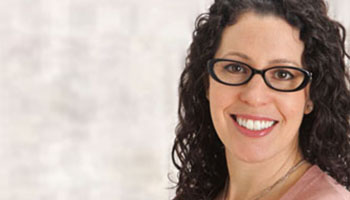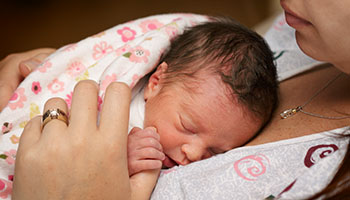HOW CAN WE HELP YOU? Call 1-800-TRY-CHOP
In This Section
Supporting Parent-infant Connections: Q&A With Amy Jo Lisanti, PhD, RN

Amy Jo Lisanti, PhD, RN, CCNS, CCRN-K
Editor’s Note: With the World Health Organization (WHO)’s designation of 2020 as “Year of the Nurse and the Midwife,” we are taking this special opportunity to recognize the community of nurse scientists at Children’s Hospital of Philadelphia. Throughout the year, we will feature nurse researchers in a series of Q&As that touch on everything from their research projects to the unique perspective of nurse scientists. This Q&A with Amy Jo Lisanti, PhD, RN, CCNS, CCRN-K, nurse scientist and clinical nurse specialist in Cardiac Nursing and the Center for Pediatric Nursing Research and Evidence-Based Practice at CHOP, is the fourth in the series. We are proud to share the valuable work and wisdom of our CHOP nurse scientists!
How long have you been at CHOP, and how long have you been a clinical nurse?
I’ll reach my 20 years at CHOP officially this June. I started my nursing career here in the Cardiac Center and slowly developed through many roles — nurse preceptor, charge nurse, clinical instructor, clinical nurse specialist, and nurse scientist. I was born and raised here through the support of so many at CHOP!
When did you start to integrate research into your career as a nurse and why?
I always wanted to be a bedside nurse and provide direct care for patients and families. I didn’t really think about nursing research in my early practice. We weren't talking about evidence-based practice back then; it wasn't a part of the nursing culture.
But I always had a longing to continue to develop as a nurse and improve care. Every two years, I challenged myself to learn something new by working in a new unit or taking on a new role. I reached a point, however, when I realized I needed to equip myself with more education if I wanted to make a greater impact to nursing practice and patient outcomes. And though I didn't know it at the time, I was already thinking like a scientist: trying to learn more in order to put that knowledge into practice.
I applied for the MSN Clinical Nurse Specialist (CNS) program at Widener University, but ended up being accepted into their accelerated MSN/PhD program. I will never forget that day because I said to my husband, “They made a mistake, but maybe I’ll just try this out.” Entering that program changed my life. My eyes were opened to a world that I belonged in and hadn’t realized. I had never thought, “I want to be a research scientist someday.” My journey into nursing science was a step-by-step process that took several providential events in my life, from getting into the PhD program, to meeting a world-renowned nurse scientist at CHOP, Dr. Barbara Medoff-Cooper, who would become an influential mentor.
Why did you choose developmental care, family stress, and congenital heart disease as your area of focus?
I have to give a lot of credit to Dr. Medoff-Cooper, my pre- and post-doctoral mentor who I met when I started my position as a CNS in the Cardiac Intensive Care Unit (CICU) here at CHOP. On my first day, my boss introduced me to Dr. Medoff-Cooper and told me that she would be my mentor. From that day on, she ever so patiently and generously invested in me, challenging me in my scientific journey.
Under Dr. Medoff-Cooper’s mentorship, I started working to bring family-centered developmental care practice into the CICU. Developmental care wasn’t a part of the culture, yet we knew that these infants were at risk for neurodevelopmental abnormalities. Back then, we often told parents not to touch their infant, we didn’t use positioning devices, and parents were not allowed to be present in daily rounds. We worked collaboratively with the CICU interdisciplinary team to change all of that.
We also instituted interprofessional developmental care rounds, as well as a developmental care committee. We were the first nursing team to publish papers calling for the need for this important paradigm shift in pediatric cardiac critical care. I found that in our developmental care rounds, parents were so grateful to have a forum to talk about their baby, such as how to connect with their baby, how to hold their baby, or how to support and care for their baby, even during critical illness. It was very clear that this was a source of great stress, but there were minimal research studies describing this phenomenon of parent stress in the CICU.
Can you tell me about some of your research projects?

Dr. Lisanti's research has shown skin to skin care reduces a mother's anxiety and increases feelings of attachment to her infant.
My research has consistently demonstrated the importance of parental role alteration — when parents who have a baby in the ICU are unable to hold, care for, or protect their baby. Babies with congenital heart disease are often immediately separated from them after birth to receive life-saving care in the CICU. Their role as a parent is completely altered. They don't know how to care for their child. They're often too afraid to even touch their babies because they are so fragile.
My research also consistently has found a relationship between this parental role alteration and mental health symptoms of anxiety and depression. To me, this is a modifiable factor that nurses can mitigate through our clinical practice. We can augment the role of parents, in order to support their mental health during a very traumatic time. In one of our studies, we’ve shown that when mothers hold their baby skin to skin, their reported anxiety levels and salivatory cortisol (a stress hormone) levels significantly reduce, and they report feeling more attached to their babies. Building on this study, I recently submitted an R21 grant to National Institute of Child Health and Human Development (NICHD) to hopefully study more about enhancing the role of parents in the CICU.
Do you have any research findings or honors that mean a lot to you?
I received a letter from a mother several years ago, in my early work as a clinical care specialist, that has continued to mean so much to me. She had a premature infant who was in an incubator in the CICU and she couldn’t hold because of the wires and tubes attached to the infant. I remember advocating to our CICU team that we have to let this mom hold the baby. We were finally able to do so, even though it took a lot of resources, and we had to make sure that we could do it safely. That mom held her baby for an hour, as well as the father. It was the only time during the infant’s hospitalization that they were able to do so.
Unfortunately, weeks later, the infant passed away from complications from her underlying medial issues. The mother sent me a letter several months after with a picture that I had taken during that hour of the mom holding the baby with the dad. She told me it was the only family picture that they had together, and she just spoke of how much it meant to her that she was able to connect, that it felt normal for a moment that she was able to hold and show love to her baby in that way. I was deeply touched by their story.
Why do you think nurse scientists are so integral to pediatrics? What unique perspective or approach do you bring?
I think we need nurse scientists, physician-scientists, social and behavioral scientists, data scientists, etc. Each discipline brings a unique lens to research. If we want to tackle the challenging questions in caring for the most vulnerable patients here at CHOP, we will need interprofessional teams of scientists working together.
I believe nurse scientists bring a unique, holistic, and family-centered lens. Nurse scientists generate knowledge on how to optimize patient and family outcomes through nursing practice. This is particularly critical for pediatric cardiovascular nursing, where rapid medical and surgical advancements have evolved greatly over the past few decades. Every new medical and surgical advancement has implications for nursing, and it’s up to nurse scientists to generate that knowledge to inform practice.
What do you hope to accomplish in the nursing research space in the future?
I hope that my research will generate strong evidence on how nurses can enhance the parental role in the CICU through developmental care interventions that improve both short and long-term mental health of parents of infants with congenital heart disease. I also hope that my research demonstrates that these care practices also support the neurodevelopmental outcomes of infants with CHD.
It’s been a privilege to mentor pediatric cardiovascular nurses, helping them to lead local developmental care initiatives here at CHOP and to present their work through poster abstracts or published manuscripts. My work is fueled by the desire to continue to provide the evidence to support pediatric cardiovascular nurses to enhance the role of parents during their infant’s hospitalization and support that essential parent-infant connection — that’s why I do what I do.
Any advice for aspiring nurse scientists?
First, if you’re a hard worker and you’re passionate about nursing, you can become a nurse scientist. Nurses cannot have evidence upon which to base our practice if we don’t have nurse scientists out there generating new knowledge and evidence. I was very intimidated by the thought of embarking upon this journey, but if I can do it, any nurse can!
Secondly, mentors make all the difference. We are blessed here at CHOP to have so many nurse scientists who would love any nurse come to them and say, “I have a question about research. What should I do next?”
Mentors are able to see what you are capable of before you can see it yourself. They can guide you and support you along the journey. I am now grateful to be working with our Ruth M. Colket endowed chair for Nursing Science at CHOP, Dr. Martha A.Q. Curley. We are never done learning from others. I think that is one of the great joys I have as a nurse scientist.


